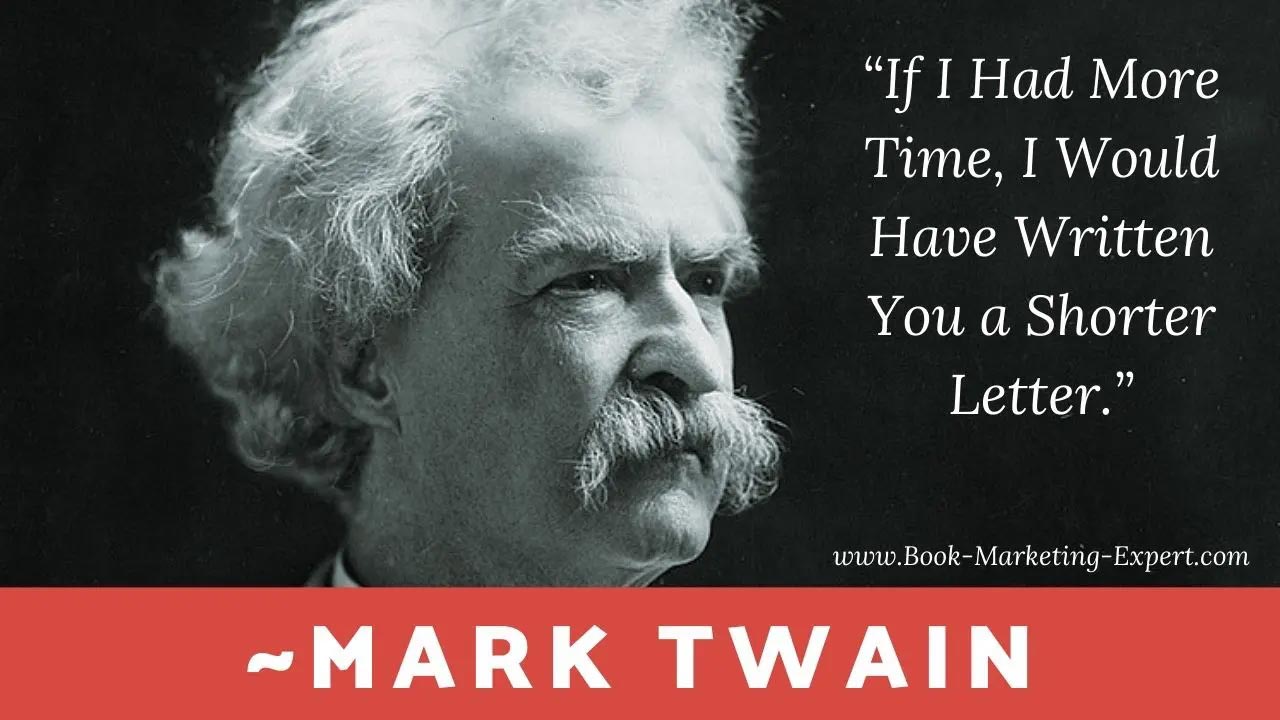
“If I Had More Time, I Would Have Written You a Shorter Letter.” – Mark Twain
By Scott Lorenz
Westwind Communications
Brevity is the soul of wit.
Most authors know the famous adage, “Brevity is the soul of wit.” This saying is from Shakespeare’s Hamlet and is, ironically, delivered by the exceedingly longwinded character Polonius. Brevity, simply defined, is shortness or conciseness of expression. While brevity is often an essential part of wit or humor, it is also a necessary tool which writers must master. In an age where attention spans are under siege from competing information streams, skillful and brief communication can cut through the noise and capture the attention of the listener.
Like Shakespeare’s Polonius, many authors recognize the importance of brevity, while struggling too actually be brief. Authors are conditioned early on with the idea that longer; more complex sentences and words are better. As people who enjoy the act of writing and are immersed in a world of words, it is easy for writers to become longwinded.
As a book publicist I bridge the gap between authors, who can be longwinded, and the media who have no time to listen or talk! So, it’s imperative that I condense everything down to the ‘elevator pitch’ answering these questions: Who is the author? What is their topic? Why should we interview them NOW?
William Zinsser, famous American writer, literary critic, and teacher said, “There are four basic premises of writing: clarity, brevity, simplicity, and humanity.” Words carry power, but length does not equal strength. Some of the most powerful and most memorable works in human history are only a few dozen words:
- The Lord’s Prayer: 66 words
- The Ten Commandments: 79 words
- The Gettysburg Address: 272 words
- Declaration of Independence: 1,322 words
- Dr. Martin Luther King’s “I Have a Dream” speech: 1,667 words.
Thomas Jefferson once said, “The most valuable of all talents is that of never using two words when one will do.” Here are three important practices for writers:
- Know the purpose of your communication. An elevator pitch or logline will be shorter than a synopsis or an excerpt. Whether writing a pitch or working on your novel, keep in mind the purpose of the writing and consider how brevity can help meet that goal.
- Remove unnecessary words. Even Jefferson’s famous quote about brevity can be reduced to the following statement, without changing the meaning. “The most valuable talent is never using two words when one will do.”
- Change the sentence structure. Revising the structure of the sentence may eliminate words and possibly even express the idea more powerfully.
Author Dennis Roth says, “If it takes a lot of words to say what you have in mind, give it more thought.” Thoughtfully implementing these practices will help you eliminate the fluff and maximize the impact of your writing.
One area in which authors typically struggle, but which is an excellent exercise in brevity, is crafting elevator pitches and loglines. Pitches and loglines are a marketing tool to help sell your idea or work, and attract the interest of publishers, editors, or producers. Having a refined a pitch or logline can also help authors maintain focus during the writing process, becoming a tool which keeps the author from getting tangled in the weeds of extraneous details that can detract from the story.
An elevator pitch or logline succinctly answers the question: “What is your book about?” and provides a tease or a taste of the story. Loglines encapsulate the story arc and themes in one to two well-crafted sentences. The pitch should evoke the curiosity of the listener, help them understand what sets your work apart, and compel them to want more. Loglines and elevator pitches should SELL the story, not tell the story.
As a writer, brevity is your friend. Brief, simple, and concise communication shows respect for the listener and their time. Utilize brevity to help your writing get the attention it deserves.
I could blather on in this article but in keeping with the title… I am going to be brief!
The Bottom Line: Be brief. Master the art of brevity to make your writing more powerful and effective.
About Book Publicist Scott Lorenz
Book publicist Scott Lorenz is President of Westwind Communications, a public relations and marketing firm that has a special knack for working with authors to help them get all the publicity they deserve and more. Lorenz works with bestselling authors and self-published authors promoting all types of books, whether it’s their first book or their 15th book. He’s handled publicity for books by CEOs, CIA Officers, Navy SEALS, Homemakers, Fitness Gurus, Doctors, Lawyers and Adventurers. His clients have been featured by Good Morning America, FOX & Friends, CNN, ABC News, New York Times, Nightline, TIME, PBS, LA Times, USA Today, Washington Post, Woman’s World, & Howard Stern to name a few.
Learn more about Westwind Communications’ book marketing approach at https://www.WestwindBookMarketing.com or contact Lorenz at [email protected] or 734-667-2090 or fill out the form below. Follow Lorenz on Twitter @aBookPublicist. Want help titling a book? Check out Scott Lorenz’s new award winning, bestselling book: Book Title Generator- A Proven System in Naming Your Book www.BookTitleGenerator.net.
Would you like help promoting your book?
If so, tell us a little about your book. What is the title? Do you have a publisher? What is the publish date? How many pages is your book? What is the cost? Do you have web site? What is your specific goal I.E., to make money, raise awareness, get the attention of an agent or publisher, sell the story to a movie or TV studio or something else?
Submit the form below with this information and we’ll get back to you as soon as possible. Thank you!


